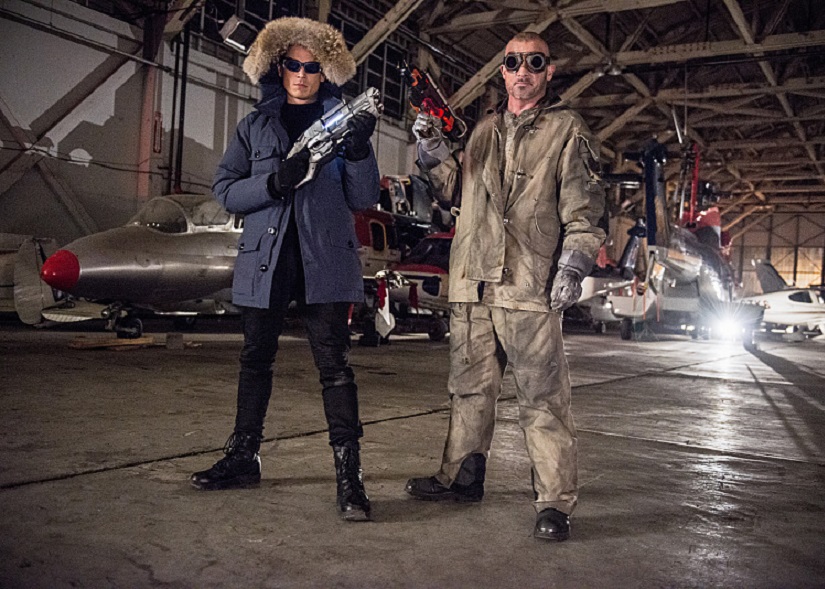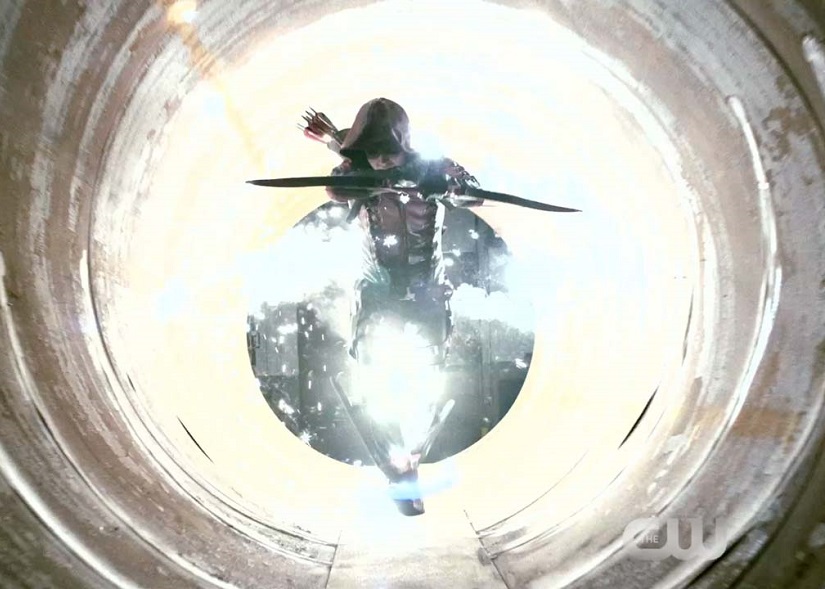This Week in TV is a new weekly feature reviewing the best, worst and most interesting episodes of television from the past seven days. The plan is to cover a wide variety of shows, but not always the same ones each week, so let us know in the comments which ones you’d particularly like to read about. This week sees CW superhero staples Arrow and The Flash return after mid-season breaks, Gotham‘s mob war start to escalate and Archer… wait… goddamn it, I swear to god I had something for this.
Gotham – “What The Little Bird Told Him”: Gotham is a show which has consistently struggled to find a coherent voice, too often allowing its most engaging elements to be drowned out by a lack of direction in their execution. The premise, taking in Commissioner Gordon’s early days at the Gotham City Police Department prior to Batman turned up on the crimefighting scene, has plenty to potentially recommend it as a study of a city gradually sliding into chaos. Unfortunately, that potential has been, if not quite squandered, certainly restricted by a need to shoehorn every rogue from Batman’s gallery into the series from the start – of the major players, only the Joker has been held back as a big reveal later down the line – while undermining attempts to create serious drama with an seemingly endless procession of ham-fisted winks to its audience.
The mob war storyline has consistently been the most engaging element because Robin Lord Taylor’s Penguin is already effectively the character from the comics – albeit younger and slimmer – meaning the tedious in-jokes were abandoned after the first few episodes. Jada Pinkett-Smith’s Fish Mooney is a new character, meaning the focus has been on establishing her character through actions rather than referencing. While Pinkett-Smith plays the part larger than life, Mooney is sly rather than spectacular, allowing her cold war with the straightlaced Dons Falcone and Marroni to build palpable tension and drama. Thanks to that comparative restraint, this episode’s pay-off – wherein Fish’s plan to induce Falcone’s retirement and take over the family was ultimately foiled – succeeded thanks to the strong groundwork established through the steadily paced plotting and character development leading up to it. Sure, Penguin blurting out his allegiance to Falcone in a concussed stupour felt like a waste of a potentially strong dramatic pivot, but everything else, from the sympathetic nature of Fish’s plan to Falcone’s reactions, felt honest to the characters in a way the show too rarely takes the time to do.
The flip side of the coin (Harvey Dent reference, wink wink!) is Gordon getting himself back on the force by catching Jack Gruber, who escaped from Arkham under his supervision. The opening shot of Gruber, aka The Electrocutioner, walking the streets was a great way of anchoring an outlandish character in the real world, only for it to go to waste once Christopher Heyerdahl broke out his insufferable Hopkins-as-Lecter impersonation. Gruber’s paper-thin motivation of killing Don Marroni came out of nowhere and allowed Gordon to take the credit for doing essentially nothing but throwing a glass of water at a fizzing box, played for a joke which never sparked into life (hey-yo!) because far too many of the series’ villain-of-the-week plotlines have already had a tendency to fizzle out (OK, that’s enough). Similarly, Morena Baccarrin’s attractive doctor – if you can find any more depth to her character than that, I’d be glad to hear it – eventually got the kiss from Gordon she’d been chasing for whatever reason, and Barbara discovered her parents were just as sick of her as the audience is.
Archer – “The Archer Sanction”: After last season’s near-disastrous Archer Vice experiment, which stranded the characters in a plot arc that went nowhere and produced few to no laughs along the way, creator Adam Reed took the series back to basics with what was termed a ‘de-boot’ for its fifth year. Good thing too, because sometimes it’s wise to be able to recognise when a successful formula is chugging along without the need for a shake-up, and last night’s Archer made that point as effectively as any from the series’ prime.
There was no danger of ‘The Archer Sanction’ springing a surprise of any sort, falling back on the safest of Archer episode structures – Archer, Lana and Ray go on a mission while Pam, Cheryl and Cyril create havoc in the office – and with a plot twist in the mission storyline which was obvious from the moment Crash McKerrin was introduced, despite an attempt at misleading the audience through the ‘Axis power’ hint. Incidentally, Archer’s mistaking Ireland for an Axis power was an easier one to make than he was given credit for: the Irish sent condolences to Germany upon Hitler’s death and the IRA were known to have shared intelligence with the Abwehr during the war itself. Given Archer’s outstanding closing summary of Romania’s involvement in WW2, perhaps he deserves a little more credit just this once.
Anyway, historical tidbits aside, the episode started magnificently with an inspired spin on the recurring voicemail gag, a well to which it returned a couple of times (“Sploosh!”; “You’re not my supervisor!”) to increasingly strong effect. Cheryl got the best obscure reference of the night, somehow oblivious to the inside of a watermelon being red despite knowing who watermelon breeder Charles Frederick Andrus was – something even Wikipedia can’t claim. From Jessica Walter’s exquisite delivery of “What fresh hell is this?” near the episode’s end to the delightful visual gag of Archer snuggling up to Ray in a sleeping bag, ‘The Archer Sanction’ may not have offered much by way of twists, but was a welcome relief to see the show back doing what it knows and does best.
The Flash – “Revenge Of The Rogues”: The Flash, like Gotham, has a bit of a consistency problem. When on form, there are few more outright entertaining shows on television right now. Its unapologetic joy in celebrating the tropes of the comic book superhero narrative are a blessed relief in the face of the urban grittiness and darkness which seems to have taken root in every other form of the genre, but it needs to start establishing some rules in terms of how far it is willing to stretch logic and narrative credibility whilst embracing that inherent silliness. Don’t get me wrong, I understand that enjoying The Flash requires a certain suspension of disbelief in terms of, for instance, how fast Barry can actually move – that joke of him returning to his flat, clearing the place out and bringing his stuff back to the West household in less than a second, for instance – but there’s a point at which an enjoyable stretching of the rules breaks into outright stupidity, which is where the climactic showdown in ‘Revenge Of The Rogues’ unfortunately ended up.
It’s a shame, because everything until then was plenty entertaining. Wentworth Miller and Dominic Purcell’s performances took the material by the scruff of the neck, with both clearly having a great time in bouncing Miller’s calm and calculating Captain Cold off against Purcell’s never-not-livid Heat Wave. Is it wrong that I was hoping that Miller would get the chance to throw out at least a couple of ice puns? Probably, but Purcell’s furious delivery of his “I’m the heat!” line just about made up for it. On the side of the angels, Grant Gustin continues to give one of the most charming performances going, even if he’s better suited to his character’s moments of glee than angst. The latter is not an emotion which suits this show well – and yes, I do know it’s on the CW – which explains why Candice Patton’s Iris so often finds herself trapped in the show’s most tedious material. Her purpose remains unclear outside whomever she’s having a relationship with and having her turn up in a panic at a superhero showdown for no good reason further undermines efforts to portray her as intelligent and independent.
That showdown was problematic for much bigger reasons though, first among which was the fact that no explanation was given as to why Barry couldn’t simply have used his speed to disarm both Cold and Heat Wave in a fraction of a second; why he couldn’t have knocked them out before they’d finished their first sentence (although the “Scarlet Speedster” nod will have warmed the hearts of many a comic fan); why the police couldn’t have simply shot or tazed them from afar – as stated in-ep, they aren’t bullet-resistant metahumans – and what the point of establishing a cordon was if they weren’t going to actually do anything. There are leaps in logic that are forgiveably fun (“Absolute hot”) and those which just make everyone involved look foolish, which became an increasingly prominent issue as the episode went on. Barry and Joe’s adorable chill-out session at the close brought everything back to the series’ biggest strengths, but Flash will have to keep an eye on exactly how far it wants its comic book logic to stretch if it wants to keep its villains as engaging as its heroes.
Arrow – “Left Behind”: Despite being the star of the show, it never hit home for me quite how much Arrow centred around Stephen Amell’s Oliver Queen until ‘Left Behind’ took him out of the picture. Roy and Diggle fill in on the crime fighting front, but without our Ollie there to provide a centre of gravity for the other characters to orbit around, the episode’s main plotline felt weightless and discordant despite providing much of the usual Arrow fare. Amell’s tortured seriousness can be awfully one-note at times, but as the old saying goes, you only know how much you miss something when it’s gone. Whether intentionally or not in an episode very much about ramming home the absence of the Arrow crew’s presumed dead leader, ‘Left Behind’ struggled to find anyone among the series’ extensive supporting cast to fill that Ollie-shaped hole (phrasing).
Part of the reason might be because, for all the cast’s talent, Ollie has been the one hogging all the character work for some time now. Diggle’s admission that he still thinks of himself as a bodyguard was an accidental reminder of how little he’s shifted from that original remit, while Roy’s early potential as a street-savy superhero has gone completely neglected in his transformation into Arrow-lite. Even Felicity, beloved Felicity, has been reduced to an Iris-esque state of being defined by her sex life rather than her abilities. Her fear of losing more friends never quite rung true beyond despair at the death of her unrequited love interest and as entertaining as Brandon Routh is as Ray Palmer, his character is not yet well enough developed for him to be an effective emotional foil.
It was left to the villains to carry the piece, which is fortunately never going to be a problem Vinnie Jones and John Barrowman are at hand. Brick would seem to be the series’ first villain with a non-Mirakuru supernatural ability, an interesting turn somewhat lost amid the moping elsewhere even as Jones played the part to its cockney hilt. Barrowman never stops being good value as Malcolm Merlyn and his habit of turning up unannounced in the Arrow cave made for the episode’s two strongest scenes. The Hong Kong flashbacks felt somewhat rote, required more to remind us of certain characters before the final reveal and to inject a by-the-book action sequence into proceedings, so hopefully it won’t be long before Oliver Queen returns to Starling City to take his rightful place back at the centre of the Arrow universe.



